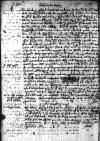Quod Dominatio Vestra commendatam habere vult causam ⌊viduae⌋ domini ⌊Georgii Schevek⌋, illi ago gratias. Quae quomodo se nunc habeat et quid haeredes praesumant, ⌊reverendissimo domino Cracoviensi⌋ descripsi, ex cuius ⌊⌋ ea omnia intelliget. Litterae serenissimae ⌊maiestatis regiae⌋ de appellationibus coram notario et testibus nondum per ⌊Adrianum Fridewalt⌋ ⌊dominis hic consiliariis⌋ sunt redditae. Detinet forsan eas usque in futurum ⌊conventum⌋ Dominatio Vestra omnem interim velit adhibere operam, ne posthac huiusmodi appellationes admittantur, nisi factae fuerint in derogationem iudicis ordinarii. Nos quidem, qui iudic{i}um officio fungimur, multis illis liberamur molestiis. Partes vero in faciendis expensis gravantur, nam etiamsi per talem modum appellatum ad serenissimam ⌊maiestatem regiam⌋ fuerit, ⌊dominis tamen consiliariis⌋ omnes causae denuo committuntur cognoscendae; ita fit, ut partes duplices cogantur facere expensas. Hoc si non fieret et appellationes illae nostris hic constitutionibus nihil detraherent, non repugnarem, ut superinscribed in place of crossed-out quin⌈quin ut ut superinscribed in place of crossed-out quin⌉ partibus concederentur.
Quae in causa legationis ad s(acram) ⌊caesaream maiestatem⌋ ⌊reverendissimo domino Cracoviensi⌋ misi, omnia mihi Dominationis Vestrae opera on the margin⌈Dominationis Vestrae operaDominationis Vestrae opera on the margin⌉ salva sunt reddita. De ea legatione si quid per ⌊oratores⌋ tam ⌊iunioris⌋ ⌊senioris⌋ quam ⌊iunioris maiestatis regiae⌋ ... illegible⌈...... illegible⌉ ex ⌊conventu Imperii⌋ rescriptum fuerit, Dominatio Vestra, rogo, confidenter ad me perscribere velit nec me celare, quid hactenus nostri ora nuntii apud serenissimam ⌊maiestatem regiam⌋ effecerunt, et qualis eventus legationis nostrae sperandus sit.
Apud me nunc nihil novi est, nec quicquam hic — adeo omnia silent — circumfertur, quod describere possem Dominationi Vestrae; cui gratias ago pro communicata legatione oratoris ⌊regis Franciae⌋, utque de superinscribed⌈dede superinscribed⌉ eventu{m} et quale responsum obtinebit mihi, me certiorem reddere et illis novitates, quae in aula sunt, addere on the margin⌈et illis novitates, quae in aula sunt, addereet illis novitates, quae in aula sunt, addere on the margin⌉ non intermittat, plu plurimum rogo.
Quam felicissime valere opto.

 AAWO, AB, D. 70, f. 366v
AAWO, AB, D. 70, f. 366v